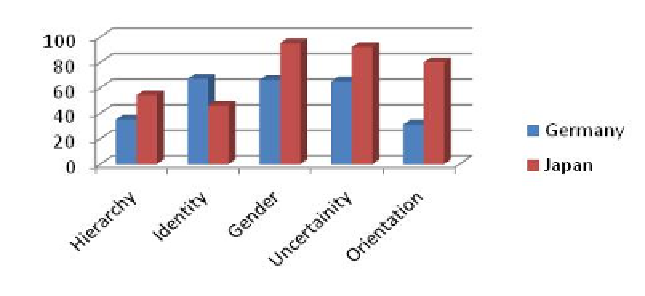Information Technology Reference
In-Depth Information
Since cultural characteristics in Hofstede theory are synthetic, a set of parameter
values indicates the cultural profile. Fig. 1 gives Hofstede's ratings [2] for Germany
and Japan. For example, in Gender dimension, Japan (95) is more masculine society
than Germany (66).
Fig. 1.
Hofstede ratings for Germany and Japan
3.2 Characterizing Social Relationship
Wierzbica [22] claimed that the concepts and ways of describing social relationships
have not been exact enough thus leading to the term being employed differently by
various investigators. Wierzbica also emphasized how the terminology used by
researches in the area of cross-cultural pragmatics also tended to be too imprecise. For
example, the term “intimacy” is used as “directness,” “spontaneity,” “solidarity,”
“self expression,” “frequency of contact,” and so on, by researchers from different
cultures without explaining what exactly is meant by the concepts. In comparing the
way in which researchers have employed such terms, it is obvious that the same
concept is not being used uniformly. Moreover, Spencer-Oatey [11] claimed that the
way social relationships are referred to remains imprecise and, secondly, people from
different cultures regard social relationships in various ways. For example, in western
culture the vertical relationship associated with “power” is seen in a negative way,
whereas in both China and Japan this is regarded as positive. Thus, a person who is
“superior” does not simply dominate or control a person of lower status as the
individuals involved are regarded as being bound together in a relationship, which
involves extensive mutual ties and responsibilities.
In this study, we employed the following four criteria which have been previously
defined by [11] for the purpose of measuring social relationships.
1. Power
(High/Low)
: By power we mean the power of the speaker over the hearer in
a given role involving a relationship. One person is thereby regarded as holding
power over another in the sense that such an individual is able to control the behavior
of another. Power can also be based on several factors, such as physical strength,
wealth, age, institutional role [11].

